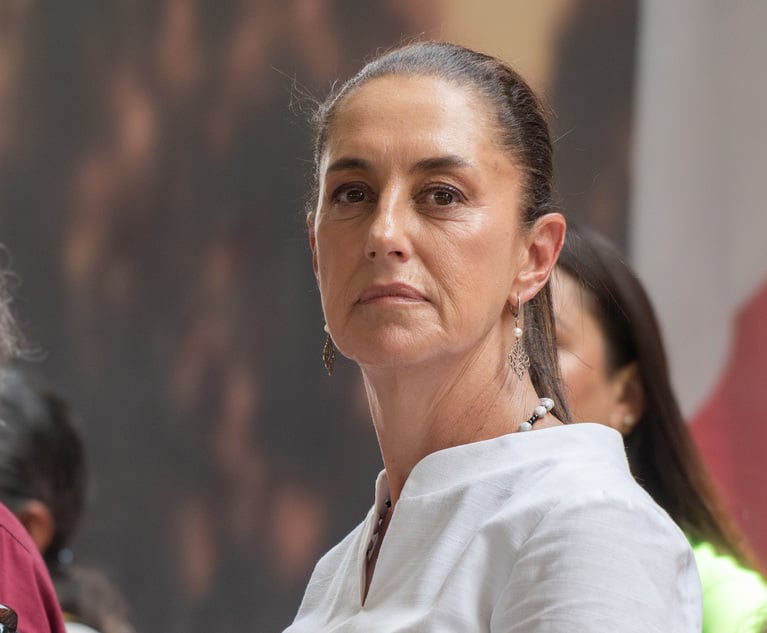Might wasn't right - 9/11's lasting legal legacy
It was probably inevitable from the moment the two aeroplanes struck the Twin Towers a decade ago that the world was about to face a period in which the competing interests of security and liberty – two issues that go to the heart of the law's role in society – would come into prolonged conflict. The former of these interests was dominant in the five years after the attacks as the US and UK pushed on with a legally controversial conflict and ushered in a series of aggressive anti-terrorism measures. In the process, the US often sought to recast terrorism in legal terms applied to war rather than criminal procedures.
September 14, 2011 at 07:03 PM
3 minute read
It was probably inevitable from the moment the two aeroplanes struck the Twin Towers a decade ago that the world was about to face a period in which the competing interests of security and liberty – two issues that go to the heart of the law's role in society – would come into prolonged conflict. The former of these interests was dominant in the five years after the attacks as the US and UK pushed on with a legally controversial conflict and ushered in a series of aggressive anti-terrorism measures. In the process, the US often sought to recast terrorism in legal terms applied to war rather than criminal procedures.
This tough stance was also evident towards the end of Tony Blair's administration, as he completed his strange journey from liberal lawyer to authoritarian hard-liner. This path culminated in a self-destructive attempt in 2005 to extend the maximum detention period without change of suspected terrorists to 90 days, which was soundly defeated.
It's possible to be an admirer of many qualities Blair demonstrated in office, while in retrospect coming to condemn the rough treatment of broadly accepted legal rights seen in Labour's third term. Blair himself famously declared that "the rules of the game are changing" with regard to the steps necessary to combat terrorism. Even those who once gave Blair the benefit of the doubt – myself included – would have to now conclude he was quite simply wrong.
On balance, 9/11 contributed also to further erosion of the deference that judges once displayed towards the executive and security services. This is probably a positive development given the huge legislative power afforded to Government under our constitution. Still, this often put judges in an ambiguous position; while they have been more exposed to the rough game of politics, they seem more than ever in demand to clean up public controversies by chairing public inquiries.
True, concepts like the rule of law, human rights and international law are frequently invoked crassly. Yet the value of some of these notions can rest as much in their ability to help societies maintain good governance and a moral position that can stand up to international scrutiny as much as it does on strict legal application.
Shortcomings in this regard in the US and UK mean such issues seem far more relevant – and far less like the topics confined to the chattering classes – than they did a decade ago. As elegantly as it is written, it is hard to imagine Tom Bingham's The Rule of Law achieving the wider resonance it managed had it not been for the era of control orders, water-boarding and Gitmo.
In attempting to sacrifice broadly-established legal concepts in the name of security, the US, and to a lesser extent the UK, has seen a huge loss of capital – morally, fiscally and politically – over the last 10 years. As such, the legal impact of 9/11 has so far been a reassertion of the rule of law, not its humbling.
This content has been archived. It is available through our partners, LexisNexis® and Bloomberg Law.
To view this content, please continue to their sites.
Not a Lexis Subscriber?
Subscribe Now
Not a Bloomberg Law Subscriber?
Subscribe Now
NOT FOR REPRINT
© 2025 ALM Global, LLC, All Rights Reserved. Request academic re-use from www.copyright.com. All other uses, submit a request to [email protected]. For more information visit Asset & Logo Licensing.
You Might Like
View All
Ex-Mayer Brown Corporate Lawyer Leads Race for German Chancellor in Snap Election
4 minute read
Mexico Dissolves Antitrust Authority in Setback to Competition

Apple Subsidiaries in Belgium and France Sued by DRC Over Conflict Minerals
2 minute read
US Wins Trade Dispute with Mexico Over Genetically Modified Corn
Trending Stories
Who Got The Work
Michael G. Bongiorno, Andrew Scott Dulberg and Elizabeth E. Driscoll from Wilmer Cutler Pickering Hale and Dorr have stepped in to represent Symbotic Inc., an A.I.-enabled technology platform that focuses on increasing supply chain efficiency, and other defendants in a pending shareholder derivative lawsuit. The case, filed Oct. 2 in Massachusetts District Court by the Brown Law Firm on behalf of Stephen Austen, accuses certain officers and directors of misleading investors in regard to Symbotic's potential for margin growth by failing to disclose that the company was not equipped to timely deploy its systems or manage expenses through project delays. The case, assigned to U.S. District Judge Nathaniel M. Gorton, is 1:24-cv-12522, Austen v. Cohen et al.
Who Got The Work
Edmund Polubinski and Marie Killmond of Davis Polk & Wardwell have entered appearances for data platform software development company MongoDB and other defendants in a pending shareholder derivative lawsuit. The action, filed Oct. 7 in New York Southern District Court by the Brown Law Firm, accuses the company's directors and/or officers of falsely expressing confidence in the company’s restructuring of its sales incentive plan and downplaying the severity of decreases in its upfront commitments. The case is 1:24-cv-07594, Roy v. Ittycheria et al.
Who Got The Work
Amy O. Bruchs and Kurt F. Ellison of Michael Best & Friedrich have entered appearances for Epic Systems Corp. in a pending employment discrimination lawsuit. The suit was filed Sept. 7 in Wisconsin Western District Court by Levine Eisberner LLC and Siri & Glimstad on behalf of a project manager who claims that he was wrongfully terminated after applying for a religious exemption to the defendant's COVID-19 vaccine mandate. The case, assigned to U.S. Magistrate Judge Anita Marie Boor, is 3:24-cv-00630, Secker, Nathan v. Epic Systems Corporation.
Who Got The Work
David X. Sullivan, Thomas J. Finn and Gregory A. Hall from McCarter & English have entered appearances for Sunrun Installation Services in a pending civil rights lawsuit. The complaint was filed Sept. 4 in Connecticut District Court by attorney Robert M. Berke on behalf of former employee George Edward Steins, who was arrested and charged with employing an unregistered home improvement salesperson. The complaint alleges that had Sunrun informed the Connecticut Department of Consumer Protection that the plaintiff's employment had ended in 2017 and that he no longer held Sunrun's home improvement contractor license, he would not have been hit with charges, which were dismissed in May 2024. The case, assigned to U.S. District Judge Jeffrey A. Meyer, is 3:24-cv-01423, Steins v. Sunrun, Inc. et al.
Who Got The Work
Greenberg Traurig shareholder Joshua L. Raskin has entered an appearance for boohoo.com UK Ltd. in a pending patent infringement lawsuit. The suit, filed Sept. 3 in Texas Eastern District Court by Rozier Hardt McDonough on behalf of Alto Dynamics, asserts five patents related to an online shopping platform. The case, assigned to U.S. District Judge Rodney Gilstrap, is 2:24-cv-00719, Alto Dynamics, LLC v. boohoo.com UK Limited.
Featured Firms
Law Offices of Gary Martin Hays & Associates, P.C.
(470) 294-1674
Law Offices of Mark E. Salomone
(857) 444-6468
Smith & Hassler
(713) 739-1250







